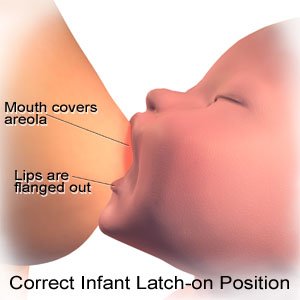
The most important thing you can do to prepare for breastfeeding is to learn all you can about it. There are many good books that discuss breastfeeding exclusively. They range from "how to" manuals to those that discuss the benefits and the more technical aspects of breastfeeding.
You should discuss your decision to breastfeed with those who are important to you. It is much more difficult to succeed if your husband, parents, or children don’t understand why you want to breastfeed your new baby. A young child may be concerned that his new brother or sister is actually hurting you. Your other children may become jealous of all the attention you are giving the new baby. Preparing them for what’s to come will make it easier.
 Learning the Techniques of Breastfeeding
Learning the Techniques of Breastfeeding There are still many misconceptions about breastfeeding. Many women find it frustrating if they don’t breastfeed easily and instinctively-they don’t realize that they need to learn the best way to breastfeed. Years ago, women would learn breastfeeding techniques from their mothers, older sisters, and other women who were breastfeeding. This isn’t as likely to happen today. Chances are reasonably good that your mother did not breastfeed you, so she can’t readily help you with your own breastfeeding.
Classes in breastfeeding techniques are available. Organizations such as the La Leche League offer support and encouragement for women having problems with breastfeeding. If you should experience remember that the treatment for most breastfeeding problems is to continue breastfeeding. Rarely does stopping help the problem.
Getting Started
Most women are now offered the opportunity to breastfeed their newborns shortly after giving birth. Unless you are so exhausted from the delivery that you can’t stay awake, you should try nursing your new baby as soon as possible. Often this is done on the delivery table. Don’t be discouraged if your baby isn’t interested-remember that he has been through a tough and tiring process, too. He may be too worn out to be interested in feeding. Don’t take this as a rejection. Some women’s breasts don’t seem to have milk in them right after the delivery; don’t be discouraged-your milk will come in. Feel free to ask questions of your doctor or obstetrical nurse about breastfeeding. Very few new mothers cannot breastfeed. Most who feel they have to discontinue just give up to soon. As mentioned before, the best treatment for most breastfeeding problems [for example, blocked ducts or insufficient milk supply] is continuing to breastfeed.
When you start, your nipples may be a little sore. This is natural; they aren’t accustomed to this type of work and need some time to "toughen up."
Breastfeeding and Your Diet
You need about five hundred calories a day more than your pre-pregnancy intake if you are breastfeeding. These additional calories, plus the calories from the three to seven pounds you stored in pregnancy for lactation, supply enough calories to make milk.
Once you reach three to seven pounds above your pre-pregnancy weight [including two to four pounds for the weight of your lactating breasts], let your weight be a guide to the number of calories you consume each day. Your activity level and the amount of milk you are producing for baby will affect your weight.


No comments:
Post a Comment